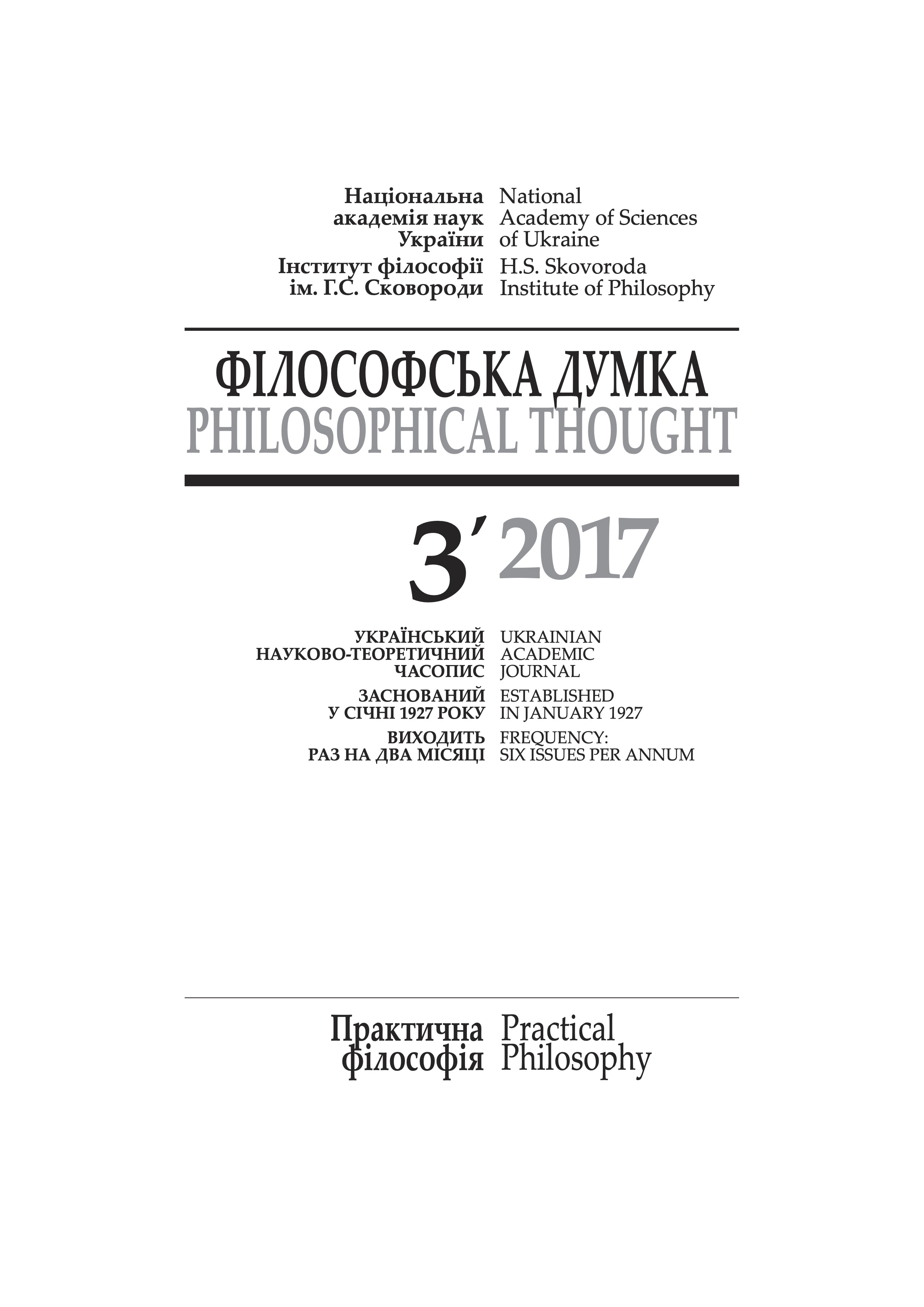The “Zombi argument” against materialism: the foundations and perspectives of further investigation
Keywords:
the zombie argument, epiphenomenalism, the knowledge argument, intuitive obviousness, analytic phenomenology, continental phenomenology, Chalmers, Descartes, HusserlAbstract
The paper deals with the main argument against the doctrine of Materialism and the heart of the mind-body problem — the Zombie argument. The main proponent of the idea of philosophical zombies is the Australian philosopher David Chalmers, whose main opus “The Conscious Mind” is wholly based on the idea of conceivability and logical possibility of zombies. The author aims to show that for the adequate analysis of Chalmers’ zombie argument, the frame of the Analytic philosophy alone is not sufficient, and due to that, one needs to involve Rene Descartes’ philosophy as well as Husserlian phenomenology. It is because the author considers Chalmers’ zombie argument as an inverted Cartesian argument from mind-body distinction and which has two levels of argumentation: intuitive obviousness and logical (conceivability-possibility frame). Chalmers’ appeal to phenomenal consciousness, experience and intuiton gives a solid basis to call his Philosophy of Mind project and himself as analytic phenomenology, and analytic phenomenologist respectively.
References
Bogachov, A. (2011). Experience and sense. Monograph. [In Ukrainian] Kyiv: Dukh i litera [=Богачов 2011]
Translation as (mis)understanding. Terminological discussion (2015). In: Philosophical Thought (5, 68–93). [In Ukrainian] [= Переклад як (не)порозуміння 2015]
Chalmers, D. (1995). Facing up to the Problem of Consciousness. In: Journal of Consciousness Studies (2 (3), 200–219).
Chalmers, D. (1996). The Conscious Mind: In Search of a Fundamental Theory. New York: Oxford University Press.
Chalmers, D. (2002a). Consciousness and Its Place in Nature. In: Chalmers, D. (ed.). Philosophy of mind: classical and contemporary readings. Oxford, New York: Oxford University Press.
Chalmers, D. (2002b). Does Conceivability Entail Possibility? In: Gendler, T., Hawthorne, J. (eds.) Conceivability and possibility. Oxford: Oxford University Press.
Chalmers, D. (2004). Imagination, Indexicality, and Intensions. In: Philosophy and Phe no men olo gical Research (68, 1, 182—190).
Chalmers, D. (2010). The Two-Dimensional Argument Against Materialism. In: The Character of Consciousness (141–205). New York: Oxford University Press.
Chalmers, D. (2013). Facing Up to the Problem of Consciousness (tr. by A. Leonov). [In Ukrainian] In: Actual problems of Mind (14, 121—152). Kryvyi Rih. [= Чалмерс 2013]
Chalmers, D. (2015). Argument 1: The logical possibility of zombies. [In Ukrainian]. Philosophical Thought (5, 60–67). [= Чалмерс 2015]
Chalmers D. (2014). Intuitions in philosophy: a minimal defense. In: Philosophical Studies (171, 3, 535–544).
Crane, T. (2000). The Origins of Qualia. In: Crane, T., Patterson, S. (eds.). The History of Mind-Body Problem. London: Routledge.
Dennett, D.C. (1986). Content and consciousness, 2nd ed. Routledge & Kegan Paul Books Ltd.
Dennett, D.C. (2013). Intuition pumps and other tools for thinking. New York, W.W. Norton & Company, Inc.
Descartes, R. (1991). The Philosophical Writings of Descartes. Tr. by J. Cottingham, R. Stoothoff, D. Murgoch, A. Kenny. Cambridge: Cambridge University Press.
Descartes, R. (2000). Philosophical Essays and Correspondence. Ed., with Introduction, by R. Ariew. Hackett Publishing Company, Inc.
Descartes, R. (2014). Meditations on First Philosophy / Metaphysical Meditations. [In Ukrainian, Latin, and French]. In: Khoma, O. (ed.). Descartes’ «Meditations» in the Mirror of Modern Interpretations (115–292). [In Ukrainian] Kyiv: Duh i litera. [= Декарт 2014]
Frankish, K. (2007). The Anti-Zombie Argument. In: Philosophical Quarterly (57, 229).
Gallagher, S., Zahavi, D. (2008). The Phenomenological Mind. An Introduction to Philosophy of Mind and Cognitive Science. Routledge.
Husserl, E. (1911). Philosophy as Rigorous Science. Logos: International Philosophy of Culture Annual. Book One (1–56) (tr. by S. Gessen). [In Russian] [= Гуссерль 1911]
Jackson, F. (1982). Epiphenomenal Qualia. In: Philosophical Quarterly, 32.
Kebuladze, V. (2012). Phenomenology of experience. [In Ukrainian] Kyiv: Dukh i litera. [=Кебуладзе 2012]
Kirk, R. (2005). Zombies and Consciousness. New York. https://doi.org/10.1093/0199285489.001.0001
Leonov, A. (2014). David Chalmers’ Philosophy of Mind. In: Actual Problems of Mind (15, 216–237). [In Ukrainian] Kryvyi Rih. [= Леонов 2014]
Ludlow, Nagasawa, Stoljar (eds.) (2003). There’s Something About Mary. Cambridge, MA: MIT Press.
Minakov, M.A. (2007). History of a Notion of Experience. Monogragh. [In Ukrainian] Kyiv: PARAPAN. [= Мінаков 2007]
Smith, D.W. (2013). Phenomenology. In: Stanford Encyclopedia of Philosophy.
Stoljar, D., Nagasawa, Y. (2003). Introduction. In: Ludlow, Nagasawa, Stoljar (eds.). There’s Something About Mary (1—22). Cambridge, MA: MIT Press.
Zahavi, D. (2003). Husserl’s phenomenology. Stanford, California: Stanford University Press.
Downloads
-
PDF (Українська)
Downloads: 1111
Published
How to Cite
Issue
Section
License
Authors who publish with this journal agree to the following terms:
- Authors retain copyright and grant the journal right of first publication.
- Authors are able to enter into separate, additional contractual arrangements for the non-exclusive distribution of the journal's published version of the work (e.g., post it to an institutional repository or publish it in a book), with an acknowledgement of its initial publication in this journal.
- Authors are permitted and encouraged to post their work online (e.g., in institutional repositories or on their website) prior to and during the submission process, as it can lead to productive exchanges, as well as earlier and greater citation of published work (See The Effect of Open Access).


